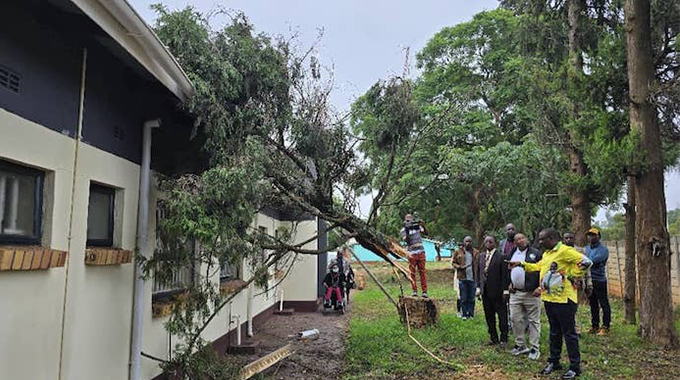Grade 6 pupils use scrap to build egg incubator

Patrick Chitumba, Midlands Bureau Chief
USING waste materials, three Grade Six pupils from Errymaple Junior School in Zvishavane have built an egg incubator which is now being showcased at the ongoing Midlands Show.

Errymaple Junior School
The three are members of the school’s science club.
An egg incubator is a machine that creates the perfect conditions for an egg to incubate and hatch successfully.
It is designed to regulate incubation temperature and humidity at perfect levels.
The pupils work is part of the fruits of the country’s new curriculum under the Ministry of Primary and Secondary Education.
The new curriculum aims to prepare learners for a largely agro-based economy, encourage life-long learning and promote patriotism, participatory citizenship and sustainable development, among other objectives.
The pupils are the talk of the Midlands Show that kicked off at the Gweru Show grounds yesterday.
The learners have shown that they are being prepared for life after school, regardless of their academic performance.
A Chronicle news crew caught up with the pupils namely Nathan Mashapa (12) and Tadiwanashe Moyo (11) as they showcased their product at the show. The third pupil Davina Moyo (11) did not travel for the show.
The egg incubator, they said, is a prototype of what they can do if they are given resources.
Using basically waste materials around the school namely cardboard boxes (casing), plastic bottles (door and body), foam rubber (insulation), wood shavings (bedding), thermostat (temperature control), pen barrels (ventilation), the pupils took two weeks to make the egg incubator.
In an interview, Tadiwanashe said he was proud to have been part of a team of pupils from Errymaple Junior School to make the egg incubator.
“We made this homemade egg incubator at our school which is based in Zvishavane as part of the science club project. With enough resources we can make more of these with ease,” said Tadiwanashe.
Explaining how it works, he said, “First you put your eggs inside the incubator. Then you look at the thermometer which is inside.
The thermometer is used to measure the temperature inside.
If the temperature is too high the thermostat will cut off on its own and if the temperature is too low, the thermostat will switch on automatically.”
However, Tadiwanashe said they managed to work around the thermostat and can operate the egg incubator without the instrument.
“You see, if the humidity is too high, we see droplets of water forming in the incubator and if it’s too low the cotton wool in the tray will be dry and we then add water and vinegar. That’s how it works,” he said.
Fellow pupil, Nathan said the incubator assists one to make money from hatching other people’s eggs.
He said they were working on making another one for the school.
“This incubator cleans the environment as you can see that it was made from recycled material.
The material or waste making this up include the cardboard boxes (casing), it was thrown away, we have an old water dispenser that was thrown away as well, plastic bottles (door and body), foam rubber (insulation), wood shavings (bedding), thermostat (temperature control) and pen barrels (ventilation).

foam rubber
All these things were thrown away and we managed to put them together to make the egg incubator,” said Mashapa.
He said they took two weeks to make the egg incubator.
“It was in May this year when we thought of making something that will contribute to cleaning the environment through making use of the waste around the school. We made this in a space of two weeks.
The incubator can fit 24 eggs,” said Mashapa.
Their Science teacher and team leader Mr Clever Gwenda said Errymaple Junior School is guided by the new curriculum.
“The role we have as a school is to impart education with production to our pupils in line with the new curriculum so that they are productive.
The pupils came up with this idea of making the incubator and we have supported them.
They must be productive while they are still learning.
“We also taught them how recycling can be part of learning and putting to good use waste and making money out of waste.
So basically they are cleaning the environment and making money,” he said.
Mr Gwenda said since Zimbabwe’s economy is agro-based, such a project enables pupils to actively participate in building the economy.
“We encourage learners to take these science projects seriously for them to be self-reliant and be able to actively participate in the global economy,” he said.
After making the incubator, the pupils, Mr Gwenda said, participated in cluster science competitions organised by Ministry of Primary and Secondary Education in Zvishavane and they came first.
“The pupils with their project participated at the cluster level before going to the district level in Zvishavane after which they made it to the provincial finals and came out tops.
Now they are going to represent the Midlands province at the national science project.
They are just waiting for a date to be announced for the national level,” he said.












Comments